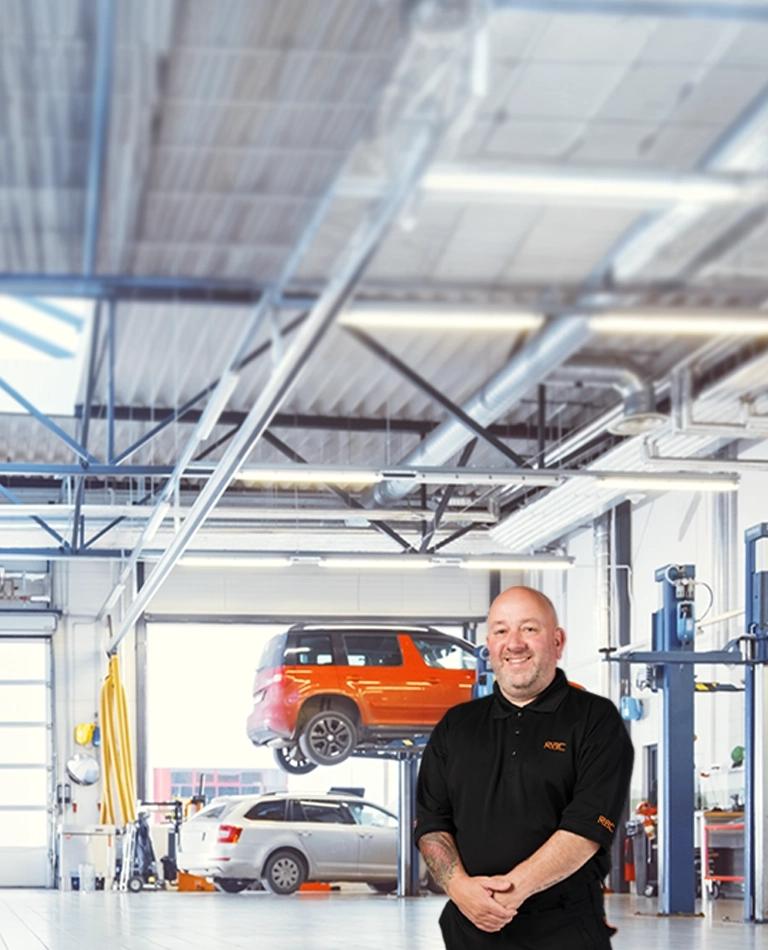
Book a car radiator repair
Your car’s radiator helps keep your engine cool. Over time, they can develop leaks, clogs, or corrosion, which can cause overheating and possible engine damage. So make sure when you need it, you get it repaired at an RAC Approved Garage.

Book a diagnostic
A mechanic will check your car for faults and talk you through any repairs you might need. There are various ways to check for faults, which could include a physical examination or plugging in to check your car’s onboard engine management system.
Content Guide
Introduction
Think of your car radiator as your engine’s personal cooling fan. It keeps everything running smoothly by stopping your engine from overheating. By understanding how it works and spotting any issues early, you can save yourself from bigger headaches down the road.
What is car radiator repair?
Car radiator repair is all about fixing problems to keep your engine cool. This might mean patching up leaks, clearing blockages, or replacing broken parts. Keeping up with regular maintenance and addressing issues quickly helps your car run smoothly.
Car radiator leak symptoms
A leaking radiator can lead to engine overheating and serious damage. Look for these signs:
- Puddles of coolant under your car
- Low coolant levels
- Overheating engine
- White exhaust smoke
- Corrosion or rust on the radiator
Car radiator repair symptoms
Beyond leaks, other symptoms signal that your radiator may need replacing:
- Engine running hotter than usual
- Steam coming from the engine
- Poor heater performance
- Sludge in the radiator
What happens during a car radiator repair?
Here’s what mechanics do during a radiator repair:
- Check for damage and leaks.
- Clear blockages.
- Fix or replace damaged parts.
- Flush the cooling system.
- Refill coolant.
Keep in mind that different shops might do a few extra steps or have their own process. It's a good idea to ask your mechanic what they’ll be doing.
What happens during a car radiator flush?
A radiator flush cleans out your radiator and cooling system. Here’s what a mechanic will do:
- Drain the old coolant.
- Fill the radiator with a cleaning solution.
- Run the engine to circulate the cleaner.
- Drain the cleaner and refill with fresh coolant.
Common issues with car radiators
Common radiator issues include:
- Leaks caused by corrosion, physical damage, or faulty seals.
- Blockages made by the build-up of mineral deposits which block the flow of coolant.
- Overheating because of a bad water pump or thermostat.
- Internal rust that can cause severe damage over time.
Car radiator repair cost
The cost of radiator repair can vary ranging anywhere between £200 and £700 depending on what where you are and who you go to. It’s a good idea to ask what’s included in the service and check for any extra costs.
Do I need a repair, flush, or replacement?
- Repair: Choose this for small leaks or minor problems.
- Flush: Go for a flush if the coolant is dirty or the radiator is a bit clogged.
- Replacement: This is needed for major damage, heavy corrosion, or big leaks.
Keeping your radiator in top shape is crucial for your car’s health. Regular checks and quick fixes can save you from expensive engine repairs. If you spot any radiator issues, get a professional mechanic to check it out and handle the problem.
Frequently Asked Questions on car radiator repair
Yes, small leaks can often be fixed, but big leaks usually need a new radiator.
Most of the time, yes. But if the damage is severe, a replacement might be necessary.
A radiator cools the engine by moving heat from the coolant to the air.
A faulty radiator can cause engine overheating, potentially leading to engine damage.
Not a good idea. It can cause your engine to overheat and lead to major damage.
With good care, a radiator can last 8-10 years or more.
Look for puddles under the car, low coolant levels, and a sweet smell from the engine.
It depends on the warranty terms. Check your vehicle’s warranty details.
It’s risky. Driving with a coolant leak can cause overheating and engine damage, so it’s best to get it fixed quickly.
Filter by


